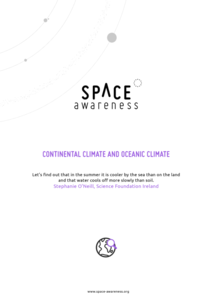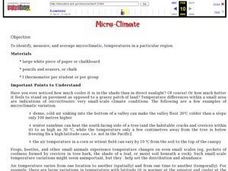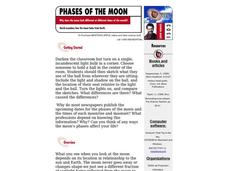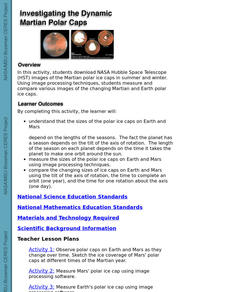Teach Engineering
A New Angle on PV Efficiency
Let me get an angle on this! Investigate the orientation of a photovoltaic panel and its effect on efficiency. By using a light source, learners collect and plot current output to determine the ultimate orientation. The resource includes...
Teach Engineering
Biomes and Population Dynamics - Balance Within Natural Systems
How large can a population become? The fifth installment of a nine-part unit teaches young ecologists about limiting factors that determine the carrying capacity of species in the Sonoran Desert. Here is a PowerPoint to help present this...
Space Awareness
Continental Climate and Oceanic Climate
There's nothing better than a cool breeze blowing in from the ocean. Scholars explore how water affects change in temperature using a hands-on experiment on climate. They use measurement tools to compare the continental and oceanic...
Curated OER
Classification and Adaptations- Streams, Rivers, and Lakes - Where the Land Meets the Sea And Caribbean Reef
In this science worksheet set, students answer 14 short answer questions about the classification and adaptation of life in streams, rivers, and lakes. They also answer 15 questions about life "Where the Land Meets the Sea" and in a...
Curated OER
Micro-Climate
Atmosphere aces investigate the microclimates that exist within a larger area. They use a thermometer to record the varying temperatures and identify the microclimates on a map that they have drawn. This exercise helps them to understand...
Carnegie Mellon University
Bathtub Model
Using a colorful infographic handout and a guide sheet, hold a class discussion about how a bathtub can serve as a model for the greenhouse effect created by Earth's atmosphere. Participants will understand that as energy or matter is...
Virginia Department of Education
Hurricanes: An Environmental Concern
Hurricanes, typhoons, and tropical cyclones are the same type of storm, but their names change based on where they happen. Scholars use a computer simulation to learn about hurricanes. Then they hypothesize ideas to prevent hurricanes...
Curated OER
The Sun in Our Lives
Third graders identify the different parts of the sun. In this astronomy lesson, 3rd graders examine how the sun's energy drive life processes on Earth. They construct a model of a solar system using large rolls of toilet paper.
Curated OER
On the Brink
Students view a film about environmental issues. They discover how environmental degradation can lead to disease. They identify the relationship between population growth and the environment.
Curated OER
Twinkle, Twinkle, Little Star
Students identify patterns in the stars. In this constellation lesson, students simulate constellations using black canisters and patterns. Students discuss the points on the constellations and how to draw imaginary lines to see the...
Curated OER
The Climate Change Skeptic's Argument: Natural Solar Cycles or Human Activity?
Teachers explore patterns in sunspots and total solar irradiance to understand the counterpoint to the human effect of global warming. In this professional development tool, teachers work through a lesson on the sun's natural...
Curated OER
Oceanic Heat Budget Activities
Students map and research imaginary islands located in different parts of the world. They describe the weather and climate of their island and show how local currents, water temperatures and waves may influence the weather patterns.
Curated OER
Solar Matters II
Students research solar energy. In this solar energy lesson, students construct a KWL chart and research solar energy through various websites and related readings. Students complete a science journal page as an assessment.
Curated OER
NASA Robots
Students explore the world of robotics. In this robotics lesson, students discover what a robot is and work with partners to find out how hard it is to accurately guide robots through simple tasks.
Curated OER
Program Your Partner
Students explore the world of robotics. In this robotics instructional activity, students study the history of robots and work with partners to find out how hard it is to accurately guide robots through simple tasks.
Curated OER
How Old Are the Stars?
High schoolers determine the age of a star cluster by observing, measuring, and plotting astronomical data. They examine the Jewe lbox cluster, located within the southern constellation Crux and determine its age.
Curated OER
Phases of the Moon
Students explore why when you examine the moon depends on its location in relationship to the sun and Earth. The moon never goes away or changes shape-we just see a different fraction of sunlight being reflected from the moon to Earth.
Curated OER
Sunny Delight
First graders explore completing experiments through the scientific method.
Curated OER
Science: Bees: An Interdisciplinary Approach
Students investigate the world of bees and describe their characteristics. by identifying the bees' parts, they demonstrate how these parts function. In the lab, students dissect bees and view the various parts under microscopes. ...
Curated OER
Iditarod Experience Journal
Students use online race updates of the Iditarod race and musher information to create a journal that one of the racers might have kept while participating in the race between Anchorage and Nome.
Curated OER
It's A Meteor
Students complete a webquest to find Earth's relationship to the sun. In this webquest lesson, students complete tasks to understand the effect of the sun on weather and time. Students create a multimedia presentation as an...
Curated OER
Weather, Sea Level Rise and Climate Change Course
Students explain the impact of glacial melting to global climate change. In this environmental science instructional activity, students design an experiment to investigate the effect of salinity change to melting glaciers. They share...
Curated OER
Investigating the Dynamic Martian Polar Caps
Young scholars download NASA Hubble Space Telescope images of the Martian polar ice caps in summer and winter, and measure and compare various images of the changing Martian and Earth polar ice caps.
Curated OER
Heavens Above
Students study the stars and their positions. In this astronomy lesson students see how scientists can predict the positions of the stars and can tell how they would have appeared in the past.

























